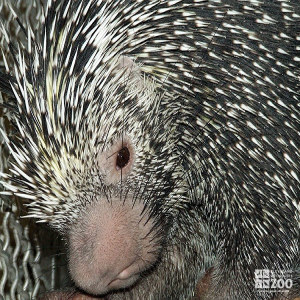Prehensile-Tailed Porcupine
[Coendou prehensilis]

The Prehensile Tailed Porcupine is the smallest of the porcupines. The body is covered with short, thick, loosely attached quills, which are used as a defense mechanism, becoming easily imbedded in the flesh of animals that disturb them. The long, prehensile tail lacks spines. The lower surface of the terminal part of the tail is naked and modified for direct contact in coiling about branches. Each limb has four digits, each of which is armed with a long, curved claw.
Share:
Range
The prehensile tailed porcupine's range is Venezuela, the Guianas, Brazil, Bolivia and Trinidad.
Habitat
Prehensile tailed porcupines inhabit forests.
Conservation Status
Least ConcernPrimary Threats
Gestation
Gestation lasts approximately 203 days.
Litter
1
Behavior
Prehensile-tailed porcupines are principally both arboreal and nocturnal. Slow in their movements, they are sure-footed climbers and use their tails in conjunction with their hands and feet. They prefer sleeping in tangled vegetation among the treetops but will also shelter in hollow limbs, tree trunks and shallow burrows. These porcupines are pugnacious, showing no fear upon capture; they bite and try to hit an adversary with their spines. They have also been observed to stamp their hind feet when excited and to roll into a ball if caught in the open.
Reproduction
Pregnant females and newborns have been reported for most months among wild prehensile tailed porcupines which, when coupled with observations of captive colonies, indicate there probably is no breeding season. Females usually mate immediately upon giving birth. Infants are born with their eyes open and "ready to go." Quills are soft at birth and harden in about a week. Weaning occurs at 10 weeks and adult size is reached at 48 weeks. Females are sexually mature at 19 months. Offspring may be produced less than a year apart.
Wild Diet
Leaves, tender stems, fruits, blossoms and roots
Zoo Diet
Monkey chow, apple, carrot, yam, lettuce, banana, grapes
